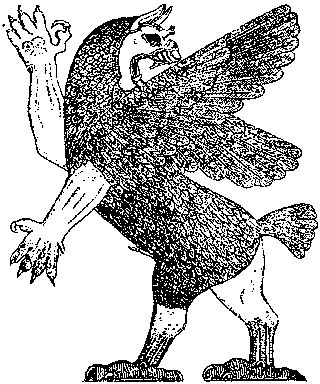
Enuma Elish 5The Babylonian Creation Myth
5 Separation of purposes in Enuma ElishEnuma Elish is obviously a mix of several quite different, if not contradictory, ingredients. For example, it contains mythical elements from older traditions – such as several Sumerian ones. Still, Enuma Elish eagerly advocates Babylonian supremacy, elevating the Babylonian god Marduk above all other gods.
Enuma Elish is a sophisticated poem, written so that only a small learned class was able to comprehend it completely. Nonetheless, it was recited during the important Babylonian New Year ritual, where it was surely expected to influence the minds of all the citizens. For the Enuma Elish epic to be understood somewhat correctly, we need to separate the ingredients and clarify the patterns of each of them in the story. MardukThe political motif of the Enuma Elish epic is to present divine arguments for the supremacy of Babylonia. This is done by glorifying Marduk, who was the primary god of that city-state.He is introduced rather late in the chain of events. Five generations of gods precede him, and the Enuma Elish epic mentions no god being born after him. Making him the last can be a way of exalting him over his predecessors, but also this is likely to have been necessary in order to make the Enuma Elish story at all believable to the people of that time, who knew of a mythology where other gods had done a lot of the ground work, so to speak.
Marduk's birth takes place right after Ea has conquered Apsu, and thereby completed the first drama of the Enuma Elish text. The lines right before those about Marduk’s birth show the signs of an ending, as clearly as the typical fairytale ‘and they lived happily ever after’ would. Ea has triumphed in the battle, and made the corpse of Apsu his residence. There he rests quietly. The last line before the birth of Marduk reads: 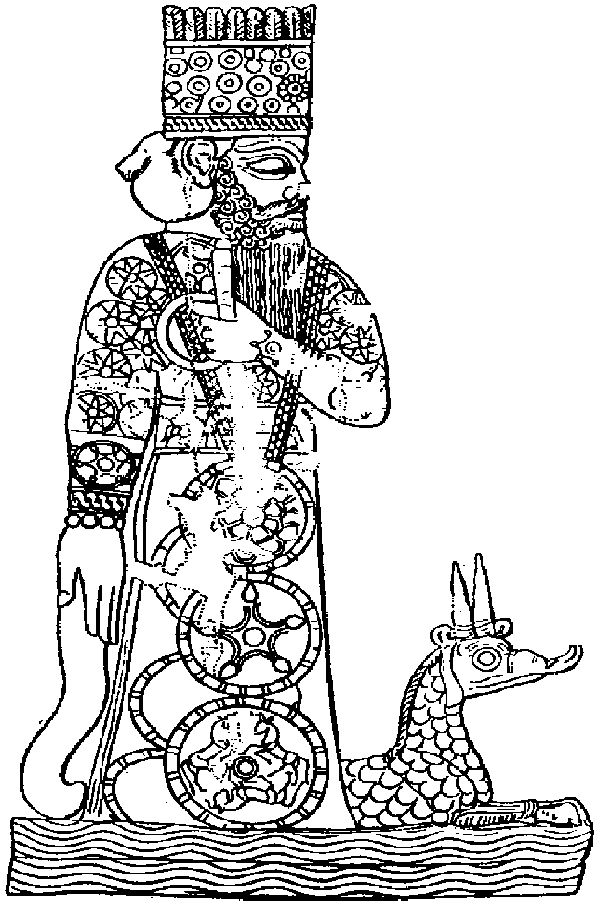 Marduk, Babylonian creation god. Marduk’s heroic deed is strikingly similar to that of Ea. His father is alone at battling and defeating Apsu, as is Marduk in battling and defeating Apsu’s spouse Tiamat. After his victory, Ea gets his royal residence and has become the obvious head of the gods, and that is the fate Enuma Elish tells for Marduk, too – although with so many more words. The similarities suggest that there may have been an early Babylonian version of the Enuma Elish story, where Marduk was actually introduced as the initial victor over both of the world parents – and the separation of the adventure into two would in that case later have been made to increase the believability of the story. Alternatively, the original pre-Babylonian version only had Apsu killed, and the second heroism, that of killing Tiamat, was introduced to honor Marduk with a deed at least as valiant as that of his father. A third possibility is that in an original Enuma Elish version, Ea defeated both Apsu and Tiamat. I would say that the last alternative is the most plausible one. To know if one or none of these possibilities is correct, we need to examine the fate of Tiamat: Had there ever been a version of the creation, where both Apsu and Tiamat were killed in one single battle? If so, Enuma Elish might have separated the deeds in order to give Marduk credit for the most splendid one of them. A similar situation appears if there is a preceding version of the story where Tiamat is never killed. Enuma Elish definitely portrays Tiamat as a peaceful lady, reluctant to anger, even when provoked. The story implies that she needs to be killed in spite of that. Even after the death of her spouse, she remains passive. It is Marduk who provokes her, by stirring her waters with his winds, and it is his presence that worried the gods who finally succeed in convincing Tiamat to take up battle.
The Enuma Elish story even presents her as innocent of commencing the war. After the war, Qingu is blamed and punished for it all. This shows a reverence toward Tiamat, the mother of creation, surpassing that shown Apsu, the father of creation. The Enuma Elish epic also clearly shows that she is in every way the superior of the two. 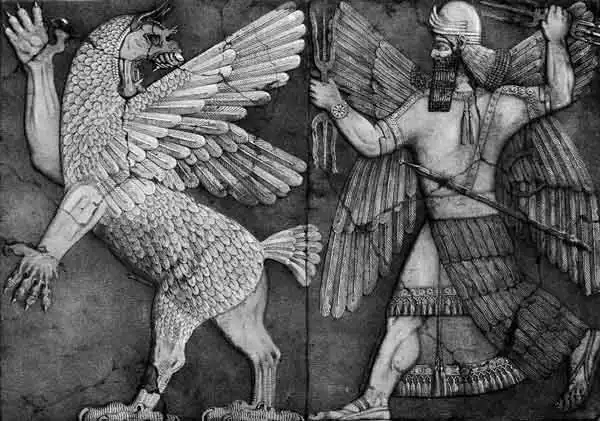 Marduk chases Tiamat. So, if the world parents needed to be killed, the big challenge must have been Tiamat, and not Apsu. If it was done in one and the same war, the lesser enemy Apsu was sure to be defeated first, in a swifter battle, and the real adversary was Tiamat. This suggests that in an original version of the creation story, Ea may have been the one to defeat them both, one after the other. If so, the Babylonian Enuma Elish edit of the story was rather gentle when robbing him of the credit for the greater feat, but giving it to his own son. Ea’s continued importance is shown by such things as his initiatives in securing his son’s powers, and the fact that it is still Ea who takes the steps to create mankind, although in accordance with Marduk’s will. If Enuma Elish is the modification of an earlier creation story, and that is partly ascertained by existing examples of earlier myths from the region, the great hero and central figure of the original version would no doubt be Ea, the Sumerian god who precedes Marduk significantly. The Babylonian Enuma Elish writers simply added a generation to the existing pantheon, and separated the war against the world parents into two. That would be the minimum change needed, in order to establish a new god over the previous ones. In the divine hierarchy, Ea resides in the corpse of his adversary, and Marduk rules over the world he created from his. They need not confront each other, since Ea’s reign is in the underworld, and Marduk rules the world of the living. I find two additional arguments for the original story having Ea kill both world parents. Ea is presented as a clever and active god of great personal resources, something of what is called a trickster – an independent schemer who gets his way no matter against what powers it needs to be done. Even in this epic aimed at glorifying Marduk, Ea is shown to have a personality, a clear identity, whereas Marduk is just glorious. Although it is not the case, Marduk seems as shallow as if he was invented by this Enuma Elish epic, but Ea appears with a character rich of its many years in human awareness.
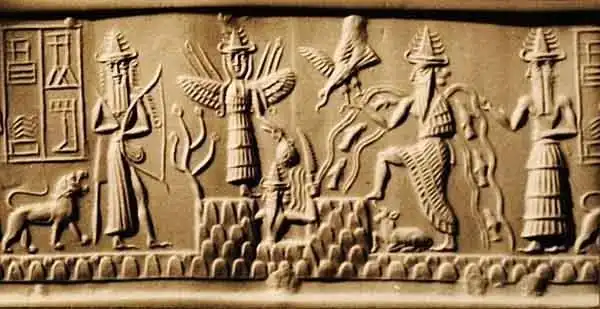 The god Ea (second from right) on the Adda Seal, c. 2300 BC. Behind Ea is two-faced messenger Usumu. In front of him is the sun god Shamash, and next the winged goddess Ishtar. As Ea is described in Enuma Elish, it would make sense to have him solve all the anxieties appearing, especially those surpassing the powers of his fellow gods. When Ea fails to defeat Tiamat, in the second part of Enuma Elish, this is rather out of character. Why would Ea suddenly fail to battle one parent, after having done it so easily with the other? Although Ea is described as a god of powers surpassing those of his fellow gods, against Tiamat he manages nothing more than they do. That would only make sense if he had failed against Apsu as well, but he could not have done so, since he made Apsu his very own residence – something that the people of the time knew very well. So, a story consistent with Ea’s character would have him kill both world parents, making his residence of the one and the world of the other. The second argument is in the events of the Enuma Elish story: Marduk’s battle with Tiamat is like a repetition of Ea’s with Apsu. Repetitions are found in many tales, especially those transmitted orally. Even though Enuma Elish is a written epic, it was recited for ritual purposes, and contains several components of the sacred, so some repetitions are to be expected. But this is a repetition in the plot, which is quite another matter. It’s a disturbing anomaly in the Enuma Elish text, otherwise written with sophistication and learned wit. The fact that both Enuma Elish wars start with the very same thing – the peace of Tiamat, or that of her water, is disturbed – makes the second appearance little more than a bland copy of the first. Of course, all the writing skills of Enuma Elish’s author are applied to making the second version surpass the first one in splendor and detail. But at the core of it, Marduk’s feat is just a repetition of his father's. A better turn of events would have been if Tiamat simply had come rushing to avenge the death of her spouse, immediately upon learning about it. Another would have been for Marduk to commence his charge at Tiamat for another reason than that of her preparation for battle. To have things start all over again is uninspired, to say the least. It hints an original story where the series of events happened only once. Such a story would have a stronger composition, and make a more distinct impression on its audience. So, before Marduk was edited into the story, it is likely to have ended with the quote above, where Ea and Damkina lean back and enjoy their triumph. This they would not be able to do without anxiety if Tiamat was still alive, since they had just slaughtered her spouse and used his corpse as their residence. Therefore, it is most likely that both Apsu and Tiamat were killed in one and the same war, with Ea as the bane of both.
And if Ea killed Tiamat, he must have been the one to make the world out of her corpse. Enuma Elish credits him with making mankind out of the blood from Qingu, Tiamat’s accomplice in their attempt to kill the gods. Qingu is a repetition of Mummu, who was the accomplice of Apsu. If there was only one war, there was just one accomplice to the world parents, and that one’s blood was used to make mankind. This is most likely to be Mummu, since Qingu is introduced later, and is rather unknown outside of Enuma Elish. That would also explain the uncertainty in Enuma Elish as to the fate of Mummu, who is tied up and held by a nose-rope, but his fate after that is not clear. Poetry in Enuma ElishEnuma Elish is written with a sophisticated and elevated language, which can be described as poetic and sacral. It is also full of wordplays understandable only to the learned, and much of it only makes sense in the written form, when being read instead of listened to. This last characteristic of it is evidence of the Enuma Elish text initially being intended for reading, not reciting, so the use of it in the Babylonian New Year’s celebration could not have been intended at the time it was written, but introduced later on. Of course, the text may have been partly edited to better serve that purpose, once the tradition of the ritual was commenced.The poetic elements of the Enuma Elish text must be considered when analyzing it, of course. The poetic style is not likely to have influenced the plot of the story significantly, but surely the choice of words and other components of form. For example, the initial appearance of the word mummu is not as the god later tied up by Ea, but as an attribute of Tiamat, meaning ‘maker’. This has caused some confusion in earlier translations of Enuma Elish. Another example is the pair of gods called Lahmu and Lahamu. Lahmu was a kind of divinity supposed to exist in a number, sometimes as many as fifty. The pairing here is certainly done to harmonize with the other pairs of primeval gods. Surely there are many poetic codes to be deciphered and considered in Enuma Elish. Especially regarding the fifty god names given to Marduk at the end of the Enuma Elish epic, there are still many uncertainties. Such clarifications are unlikely to change the content of the story in any significant way, but to deepen the understanding of it, especially as to its symbolic thinking. And that can help toward an understanding of how the Babylonians related to their cosmogonic myths – in what way they believed them, how they perceived their gods, and so forth.
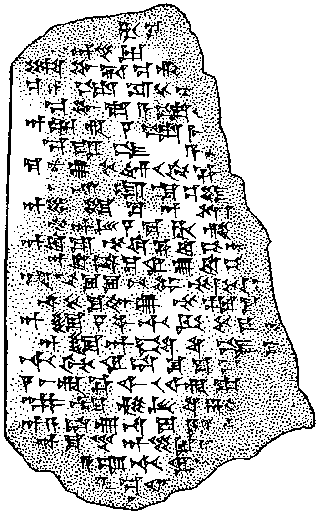 Enuma Elish, the first tablet. RecitationAlthough Enuma Elish was clearly written to be read and not listened to, it may very possibly be based on stories that were originally orally transmitted, and it was recited at Babylonian festivals. So, components belonging to oral form may still be present in the Enuma Elish epic.Evident examples of this are the repetitions of substantial parts of the Enuma Elish text, which have a ritual character to them. They are long recapitulations of what has happened right before, followed by the next short step of the plot, and then a new recapitulation. A modern reader is reminded of the recapitulation used in TV-series, when the major events of the last episode are retold in a comprised form. In Enuma Elish, though, the recapitulations are word for word. In a long recital or enactment, they would have a ritualistic function, as well as keeping the audience aware even through a long and complex ritual, but for a reader they are disturbing, breaking the flow of the story. Therefore, they may have been added when the Enuma Elish epic started to be recited in rituals. As a recital, several of the ingenuities of the Enuma Elish text were surely lost to most listeners, but in a sacral ritual this might have been a benefit in the eyes of the priesthood, and adding to the elevated status of it. The ending of Enuma Elish, with the monotonous listing of god names for Marduk, is definitely more suiting to a ritualistic recital than to reading.
The last significant action taking place in Enuma Elish, before the naming and praising of Marduk, is the creation of Babylon. When it is done, Marduk invites all the gods to a great banquet, where the new world order is confirmed, and the gods vow to obey Marduk:
Apart from what is mentioned above, I see no indication of significant alterations having been done to the Enuma Elish epic in order to use it at recitals. A possible oral origin of parts of the story is not likely to concern Marduk’s role in it, which is probably altogether a written addition without a significant oral tradition preceding it. The story up until the appearance of Marduk, on the other hand, is likely to have oral roots.
6 Enuma Elish: Mode of CreationEnuma ElishThe Babylonian Creation Myth
This article about the Enuma Elish Babylonian Creation Myth was originally written in the year 2007 for a seminar at the Department of History of Ideas, Lund University, as a part of my dissertation in progress on Creation Myths and their patterns of thought. Transforming the text to webpages, I have excluded footnotes, or edited them into the text.
MENUCreation Myths Around the WorldHow stories of the beginning began.
The Meanings of MythologyTheories through history about myth and fable.
Archetypes in MythsThe mythological symbols and what they stand for.
The Logics of MythPatterns of creation.
CREATION MYTHS IN DEPTHCreation in Rig Veda 10:129The paradox of origin, according to an Indian myth.
Genesis 1The first creation story of the bible scrutinized.
Enuma ElishThe ancient Babylonian creation myth.
Xingu Creation of ManThe insoluble solitude of gods and humans.
ContactAbout Cookies
ON MY OTHER WEBSITESFreudian Theories on Myth and ReligionThe writings by Sigmund Freud and other Freudians on mythology and religion examined.
Jungian Theories on Myth and ReligionThe writings by Carl G. Jung and other Jungians on mythology and religion examined.
Myth of CreationAn introduction to the subject of creation myths and the patterns of thought they reveal.
Cosmos of the AncientsWhat the Greek philosophers believed about the cosmos, their religion and their gods.
Life EnergyThe many ancient and modern life force beliefs all over the world explained and compared.
TaoisticTaoism, the ancient Chinese philosophy of life explained. Also, the complete classic text Tao Te Ching online.
|
 Archetypes of Mythology
Archetypes of Mythology Psychoanalysis of Mythology
Psychoanalysis of Mythology Cosmos of the Ancients
Cosmos of the Ancients Life Energy Encyclopedia
Life Energy Encyclopedia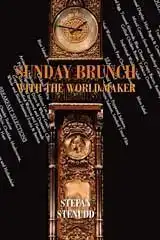 Sunday Brunch with the World Maker
Sunday Brunch with the World Maker Fake Lao Tzu Quotes
Fake Lao Tzu Quotes Stefan Stenudd
Stefan Stenudd